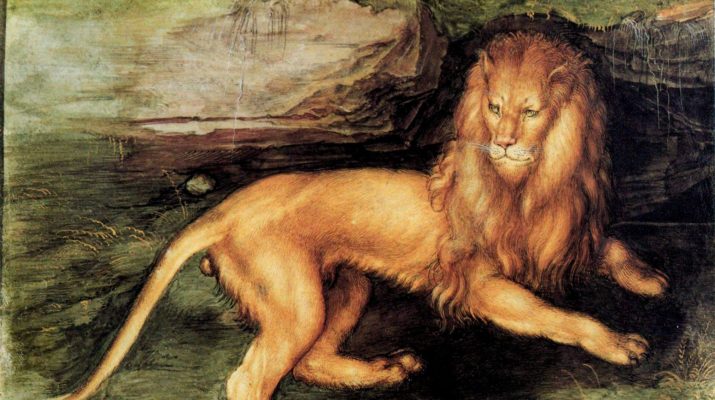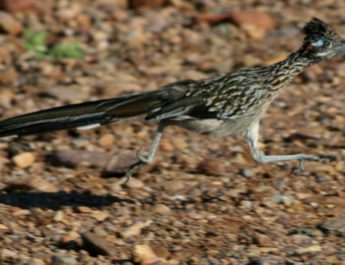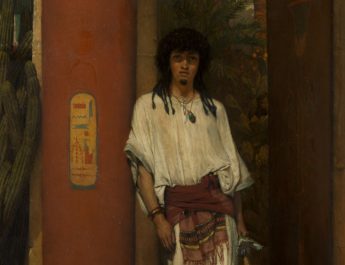Psalm 7
A ShiggaionA of David,B which he sang to the LordC concerning Cush,D a Benjaminite.E
A “Shiggaion” = shiggayon. 2x in OT. Perhaps from shagah (to go astray, wander, mislead, sin; to reel as if drunk; figuratively being enraptured). This is shiggaion, perhaps referring to a melody that has quick rhythmic changes or a poem that rambles.
B “David” = david. From the same as dod (beloved, love, uncle); the root may mean to boil, which is used figuratively to describe love. So, this implies someone you love such as a friend, a lover, or a close family member like an uncle. David’s name likely means something like “beloved one.”
C “Lord” = YHVH. From havah (to be, become) or hayah (to come to pass, become, be). This is the name of the God of Israel, the self-existent and eternal one, the tetragrammaton. This pronunciation has been lost to time so “Lord” is generally used in its place.
D “Cush” = kush. Perhaps from Egyptia k’sh (Cush). This is Cush or his descendants. Also, Ethiopia – a place south of the Nile Valley. See https://en.wiktionary.org/wiki/%D7%9B%D7%95%D7%A9#Hebrew
E “Benjaminite” = ben-yemini. 9x in OT. From Binyamin (Benjamin; meaning “son of the right hand”; Jacob’s son, his descendants, and their territory); {from ben (son, age, child) + from yamin (right hand or side; that which is stronger or more agile; the south); {perhaps yamam (to go or choose the right, use the right hand; to be physically fit or firm)}}. This is one descended from the tribe of Benjamin.
1 O Lord my God,F in you I take refuge;G
saveH me from all my pursuers,I and deliverJ me,
F “God” = Elohim.
G “take refuge” = chasah. This is to take refuge or flee for protection. Figuratively, it means to hope or trust in someone or something.
H “save” = yasha. To deliver, defend, help, preserve, rescue, be safe. Properly, to be open, wide or free, which implies being safe. Used causatively, it means to free.
I “pursuers” = radaph. This is to chase after, pursue, hunt, or persecute. It is running after someone or something, generally with hostile motives.
J “deliver” = natsal. This is to snatch someone or something away in a good sense – as rescue, defend, or deliver – or in a bad sense – as strip or plunder.
2 or like a lionK they will tear meL apart;M
they will drag me away,N with no one to rescue.O
K “lion” = ari. From arah (to gather or pluck). This is a young lion.
L “me” = nephesh. Related to naphash (to refresh or be refreshed). This is soul, self, person, emotion. It is a breathing creature. Can also refer to appetites and desires.
M “tear…apart” = taraph. This is to tear or pluck off into pieces, to rend or catch. It can also mean supply with food.
N “drag…away” = paraq. 10x in OT. This is to tear apart, break off, drag away, or crunch. Figuratively, it can mean to deliver.
O “rescue” = natsal. Same as “deliver” in v1. See note J above.
3 O Lord my God, if I have done this,
if there is wrongP in my hands,
4 if I have repaidQ my allyR with harmS
or plunderedT my foeU without cause,V
P “wrong” = evel. Perhaps from aval (to deal unjustly, act in a wrongful way, a wrongdoer). This is injustice, wrong, moral evil, acts of violence, or unrighteousness.
Q “repaid” = gamal. This is how one deals with someone whether positively or negatively – so to reward, requite. It can also mean to wean or the work that goes into something ripening.
R “ally” = shalam. This is to be complete or sound – to have safety mentally, physically, or extending to one’s estate. So, if these things are safe and complete, the implication is that one would be friendly; and, if being friendly, one would make amends and that friendship would be reciprocated. This is the root verb that “shalom” comes from, the Hebrew word for peace.
S “harm” = ra’. From ra’a’ (to be evil, bad, afflict; properly, to spoil – to destroy by breaking into pieces; figuratively, to cause something to be worthless; this is bad in a physical, social, or moral sense; that which displeases, to do harm or mischief, to punish or vex). This is bad, disagreeable, that which causes pain, misery, something having little or no value, something that is ethically bad, wicked, injury, calamity. This refers to anything that is not what it ought to be – a natural disaster, a disfigurement, an injury, a sin.
T “plundered” = chalats. This is to turn back or away in a literal or figurative sense. So, it could be return, break, build, retreat. It doesn’t necessarily imply going back to the place you started.
U “foe” = tsarar. This is to bind, restrict, narrow, be cramped, an adversary.
V “without cause” = reqam. 16x in OT. From riq (this is to be empty or to make empty; also vanity, emptiness, something worthly, in vain); from ruq (to pour out in a literal or figurative sense, hence, to be or make empty). This is emptily, empty-handed, without cause, in vain, ineffectually, or undeservedly.
5 then let the enemy pursue and overtake me,
trampleW my lifeX to the ground,
and layY my soulZ in the dust.AA SelahBB
W “trample” = ramas. 19x in OT. This is to trample or tread down. It could be to work as a potter, to walk, or to be abusive.
X “life” = chay. From chayah (to live or keep alive literally or figuratively). This is alive, living, lifetime. It can also be used to describe someone’s age. It can refer to animals, plants, water, or a company or congregation of people. It is life in a very broad sense.
Y “lay” = shakan. This is to settle down in the sense of residing somewhere or staying there permanently. It can mean abide or continue. “Mishkan,” taken from this verb, is the Hebrew word for the Tabernacle (as a place where God abided).
Z “soul” = kabod. From kabad (to be heavy, weighty, burdensome). This is weighty. Figuratively, glorious, abundant, riches, honor, splendor – a reference to one’s reputation or character. This word is often used to describe God and God’s presence.
AA “dust” = aphar. May be related to aphar (to throw dust, be dust). This is dust as powdered, perhaps gray colored. It could be ashes, powder, ground, dry earth, clay mud, or rubbish.
BB “selah” = selah. From salal (to lift up, build, pile, extol, exalt; can also be used for opposing as a dam holds back water). This is to lift up or exalt. Also, “selah” in the psalms where its precise meaning is uncertain. It could be a pause in the music, a moment of silence. It could signal a change in the service or mean something akin to amen.
6 Rise up,CC O Lord, in your anger;DD
lift yourself up against the furyEE of my enemies;
awake,FF O my God;GG you have appointedHH a judgment.II
CC “rise up” = qum. To arise, stand, accomplish, establish, abide. This is rising as in rising against, getting up after being sick or asleep, arising from one state to another, becoming powerful, or rising for action. It can also be standing in a figurative sense.
DD “anger” = aph. From anaph (to be angry; properly, breathing hard as a signifier of being enraged). This properly refers to the nose or nostril and by extension the face. It can specifically refer to anger or wrath as one breathes hard and nostrils flare in times of great anger.
EE “fury” = ebrah. From eber (the region beyond, passage, quarter, opposite side; generally the east); from abar (to pass over, pass through, or pass by; cross over or to alienate; used for transitions). This is overflow or a passionate outburst. So, fury, anger, or rage.
FF “awake” = ur. This is to arise, lift, exult, or stir. It is to wake in a literal or figurative sense.
GG “God” = el.
HH “appointed” = tsavah. This is to charge, command, order, appoint, or enjoin. This is the root that the Hebrew word for “commandment” comes from (mitsvah).
II “judgment” = mishpat. From shaphat (to judge, defend, pronounce judgment, condemn, govern). This is a verdict or formal sentence whether from humans or from God. It includes the act of judging as well as the place that judging takes place, the suit itself, and the penalty. Abstractly, this is justice, which includes the rights of the participants.
7 Let the assembly of the peoplesJJ be gathered around you,
and over it takeKK your seat on high.LL
JJ “peoples” = leom. Root may refer to gathering. This is people, a community, or a nation.
KK “take” = shub. To turn back, return, turn away – literally or figuratively. Doesn’t necessarily imply going back to where you started from. This is also the root verb for the Hebrew word for repentance “teshubah.”
LL “high” = marom. From rum (to be high, rise, exalted, become proud, display, offer, present, set apart, extol; to rise in a literal or figurative sense). This can be height, high place, or lofty. It can be either exalted or haughty/proud. It can refer to dignity or to heaven.
8 The Lord judges the peoples;MM
judgeNN me, O Lord, according to my righteousnessOO
and according to the integrityPP that is in me.
MM “peoples” = am. From amam (to darken, hide, associate; creating shadows by huddling together). This is people or nation. It can be used specifically for a tribe, collectively of troops or armies, or figuratively to refer to a flock of animals.
NN “judge” = shaphat. Related to “judgment” in v6. See note HH above.
OO “righteousness” = tsedeq. This is rightness, righteousness, vindication. It is everything that is just or ethical. That which is right in a natural, moral, or legal sense. It also includes just weights (i.e. true weights). Figuratively, this is justice, righteousness, equity – even prosperity.
PP “integrity” = tom. From tamam (to finish or accomplish; to make perfect, demonstrate that you are upright; consume; to complete in a literal or figurative sense). This is completeness or full measure. So, it can be blameless, moral innocence, prosperity, or integrity. Also used to refer to a portion of the high priest’s breastplate.
9 OQQ let the evilRR of the wickedSS come to an end,TT
but establishUU the righteous,VV
QQ “O” = na. This particle is used for requests or for urging. It can be we pray, now, I ask you, oh. This is the same “na” in “hosanna.”
RR “evil” = ra’. From ra’a’ (to be evil, bad, afflict; properly, to spoil – to destroy by breaking into pieces; figuratively, to cause something to be worthless; this is bad in a physical, social, or moral sense; that which displeases, to do harm or mischief, to punish or vex). This is bad, disagreeable, that which causes pain, misery, something having little or no value, something that is ethically bad, wicked, injury, calamity. This refers to anything that is not what it ought to be – a natural disaster, a disfigurement, an injury, a sin.
SS “wicked” = resha. From rasha (to be wicked, guilty, make trouble, do wrong; can also be condemn, guilty, inflict punishment; this verb implies disturbing or violating). This is wrong, particularly moral wrong. It can we wickedness, evil, wicked deeds, or something that is ill-gotten.
TT “come to an end” = gamar. 5x in OT. This is to end, perfect, or accomplish. It could be end as to complete or end as a failure.
UU “establish” = kun. Properly, this means in a perpendicular position. So, it is set up in a literal sense – establish, fix, fasten, prepare. In a figurative sense, it is certainty, to be firm, faithfulness, render sure or prosperous.
VV “righteous” = tsaddiq. Related to “righteousness” in v8. From the same as tsedeq (see note NN above). This is just, innocent, righteous, righteous one, or lawful.
you who testWW the mindsXX and hearts,YY
O righteous God.
WW “test” = bachan. This is to examine, test, or prove – as one tests metals. It can also be used literally or figuratively for investigating or trying.
XX “minds” = kilyah. Perhaps from keli (something that was prepared – any implement, utensil, article, vessel, weapon, or instrument; also includes jewels, weapons, bags, carriages, and furniture); from kalah (to end, be finished, complete, prepare, consume, spent, or completely destroyed). This is inward parts, such as kidney or heart. It can also be inmost being as feelings, mind, or within.
YY “hearts” = libbah. 8x in OT. From the same as lebab (the heart, courage, one’s inner self, the mind, or the will); may be related to labab (to encourage; properly, to be encased as with fat; used in a good sense, this means to transport someone with love; used in a bad sense, it can mean to dull one’s senses). This is heart.
10 God is my shield,ZZ
who saves the uprightAAA in heart.BBB
11 God is a righteous judge,
and a God who has indignationCCC every day.
ZZ “shield” = magen. From ganan (to surround, cover, defend, protect). This is a shield, defense, or figuratively a protector. It can also be used for a crocodile’s hide.
AAA “upright” = yashar. From yashar (to be straight, right, even, smooth, or agreeable; figuratively, to make something pleasant or prosperous). This is straight, right, level. Also, it is pleasing, whether pleasing God or pleasing other people. So, it is upright or righteous.
BBB “heart” = leb. Related to “hearts” in v9. May be related to labab (see note YY above). This is the heart, courage, one’s inner self, the mind, or the will. Heart is only used in a figurative sense in the Old and New Testaments.
CCC “has indignation” = zaam. 12x in OT. Properly, this refers to foaming at the mouth and so being enraged or angry. It can also be to curse or denounce.
12 If one does not repent,DDD God will whetEEE his sword;FFF
he has bentGGG and strungHHH his bow;III
DDD “repent” = shub. Same as “take” in v7. See note KK above.
EEE “whet” = latash. 5x in OT. This is to hammer into an edge, so, to sharpen. It can be to hammer or whet. Also, a forger or instructor.
FFF “sword” = chereb. From charab (to stack, slay). This is any sharp instrument like a sword, dagger, axe, or mattock.
GGG “bent” = darak. This is to tread, march, to walk. Can also mean affixing a string to a box since one needs to step on it to bend it in the process. So, also an archer.
HHH “strung” = kun. Same as “establish” in v9. See note UU above.
III “bow” = qesheth. Perhaps from qush (to set a trap, lure, ensnare) OR from qashah (to be fierce, cruel, dense, tough, severe). This is a bow, arrow, or archer. Bow can be used figuratively for strength.
13 he has preparedJJJ his deadlyKKK weapons,LLL
makingMMM his arrowsNNN fiery shafts.OOO
JJJ “prepared” = kun. Same as “establish” in v9 & “strung” in v12. See note UU above.
KKK “deadly” = mavet. From muth (to die in a literal or figurative sense). This can be death, deadliness, the dead, or the place where the dead go. It can be used figuratively for pestilence or ruin.
LLL “weapons” = keli. Related to “minds” in v9. See note XX above.
MMM “making” = paal. This is to do, make, work, or accomplish. Generally refers to regularly repeated or systematic action – so, to practice.
NNN “arrows” = chets. From chatsats (to divide, chop, pierce, distribute, shoot an arrow, an arhcer). This is an arrow or archer, shaft, staff. Properly, it is someone or something that pierces, such as an arrow. It can imply a wound. Used figuratively of God’s thunder bolt.
OOO “fiery shafts” = dalaq. 9x in OT. This is to burn or flame in a literal or figurative sense. It can also be to chase or hotly pursue.
14 SeePPP how they conceiveQQQ evil,RRR
and are pregnant with mischief,SSS
and bring forthTTT lies.UUU
PPP “see” = hinneh. From hen (lo! Behold! If, though; an expression of surprise). This is to draw attention, show suddenness or surprise, or to emphasize the importance of the coming statement. See! Lo! Behold!
QQQ “conceive” = chabal. This is to bind, pledge, or wind tight. Figuratively, this can refer to perverting or destroying something. It can also be used of writhing in pain, particularly in reference to childbirth.
RRR “evil” = aven. Root may mean panting as one does when expending a lot of energy, especially when it comes to nothing. This is nothingness, trouble, sorrow, distress, wickedness, evil, harm, sorrow, misfortune, and mischief. It is also used specifically to refer to idols.
SSS “mischief” = amal. From amal (to work – hard labor). This is trouble, toil, labor as well as misery, sorrow, or iniquity. It is word that wearies through effort so hence worry – can refer to body or mind.
TTT “bring forth” = yalad. This is to bear or bring forth. It can mean to act as midwife or to show one’s lineage. This is often used for birth or begetting.
UUU “lies” = shaqer. Perhaps related to shaqar (to treat, deal falsely; generally to lie). This is deception, lie, disappointment, or thing that is vain.
15 They makeVVV a pit,WWW digging it out,XXX
and fall into the holeYYY that they have made.
VVV “make” = karah. 17x in OT – 8x of digging a pit or trap, 2x of digging a well, 2x of digging a tomb, 2x of bargaining, 1x shriveled, 1x opening an ear, and 1x of digging up evil. This is properly to dig or open up. Figuratively, it can be to plot or make a banquet.
WWW “pit” = bor. From bur (to bore; figuratively, to explain, examine, or clear up). This is a pit – generally a cistern or dungeon. It could also be a well or fountain.
XXX “digging…out” = chaphar. This is properly to pry into. It can also mean to dig search for, sink, or explore.
YYY “hole” = shachath. From shuach (to bow or sink down in a literal or figurative sense, humble). This is ditch, trap, grave, or hole. Figuratively, it could be destruction or corruption.
16 Their mischief returnsZZZ upon their own heads,AAAA
and on their own headsBBBB their violenceCCCC descends.
ZZZ “returns” = shub. Same as “take” in v7 & “repent” in v12. See note KK above.
AAAA “heads” = rosh. This may come a word that means to shake. It is the head, captain, or chief. It can also be excellent or the forefront. It can be first in position or in statue or in time (i.e. the beginning).
BBBB “heads” = qodqod. 11x in OT. Perhaps from qadad (to bow the head, stoop, bow in deference). This is the scalp or crown of the head.
CCCC “violence” = chamas. From chamas (to violate, do violence, to wrong; implies mistreatment). This is violence, cruelty, damage, wrong, injustice, or unrighteous. Violence implies a wrong done. The term is also used to describe unjust gain.
17 I will give to the Lord the thanksDDDD due to his righteousness,
and sing praiseEEEE to the nameFFFF of the Lord, the Most High.GGGG
DDDD “give…thanks” = yadah. From yad (hand). This is to throw one’s hands into the air in a gesture of praise. So, it is to praise, give thanks, or make a confession.
EEEE “sing praise” = zamar. Perhaps from zamar (to trim or prune). This is making music. It is used specially of music to worship God. So, music with singing, singing praise, or singing psalms.
FFFF “name” = shem. May be from sum (to put, place, set). This is name, fame, renown. A name was thought to indicate something essential about a person – something about their individuality. So, this word can also mean honor, authority, or character.
GGGG “Most High” = elyon. From alah (to go up, ascend, be high, be a priority; to arise in a literal or figurative sense). This is most high, upper. It refers to elevation – so, lofty.
Image credit: “Lion” by Albrecht Dürer, 1494.




